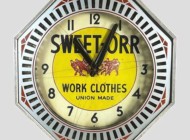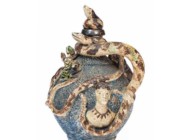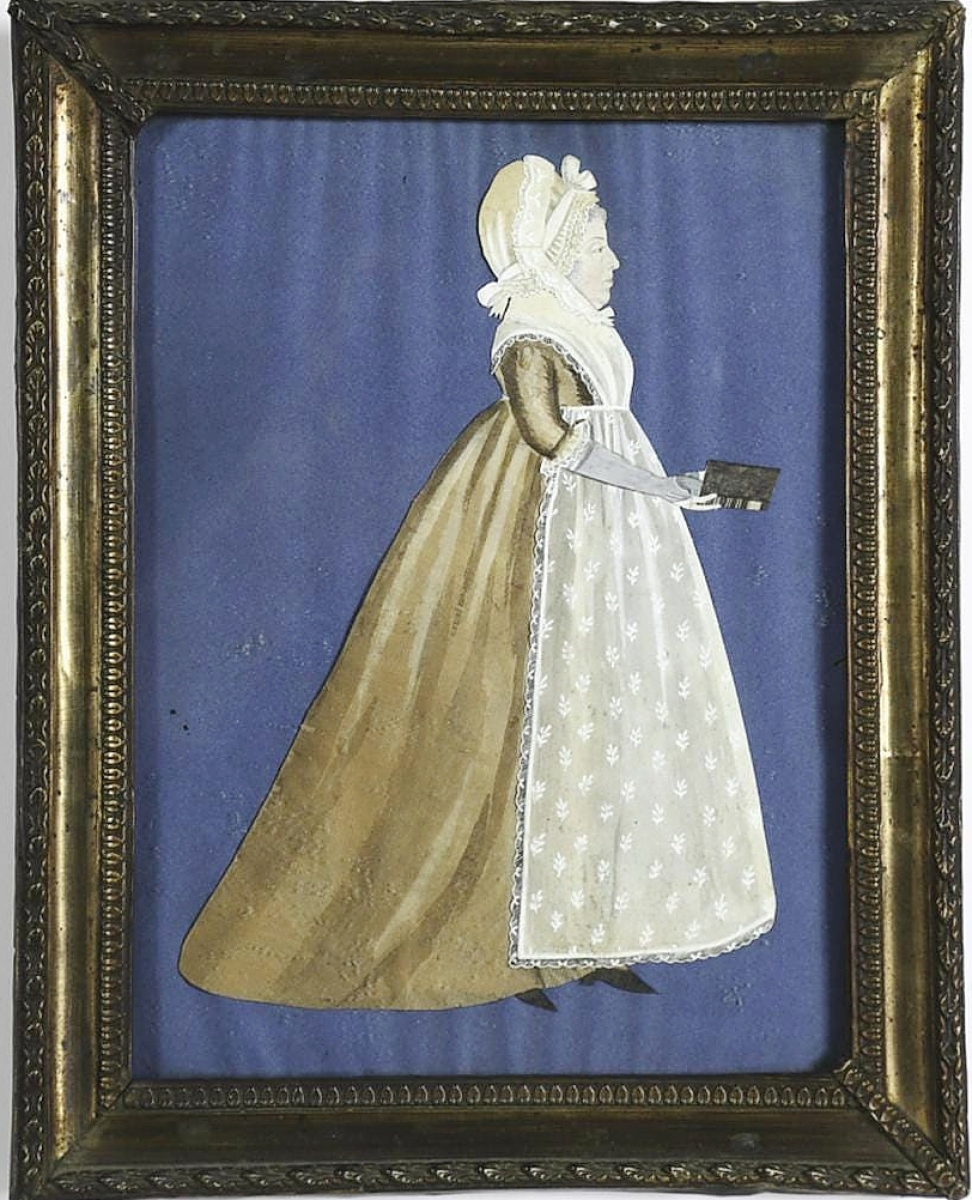
At $48,000, a “dressed” miniature portrait by sisters Mary Way and Betsy Way Champlain was the highest priced item in the sale. Around 1800, the Connecticut sisters produced numerous painted miniature portraits. Some, however, utilized cutout paper profiles attached to fabric backgrounds, with facial features added in watercolor and with pieces of fabric pasted on the background to represent clothing. This one is destined for an upcoming exhibition at the Lyman-Allyn Museum in New London, Conn.
Review by Rick Russack, Additional Photos Courtesy John McInnis Auctioneer
AMESBURY, MASS. – All of the material in John McInnis’ March 20 sale came from one home in Maine. Multiple generations lived in the house and collected, with the collecting beginning shortly after World War II. Tastes of the collectors may have changed over time, but the collections spanned 250 years – from the Pilgrim Century to 1950s pottery and decorative arts. Included was a 1743 sampler, Paul Revere silver, numerous Liverpool jugs, Eighteenth and Nineteenth Century ceramics, textiles, paintings and much more.
The main attraction was the furniture, nearly all American, and it drew interest from several major dealers (some of whom exhibit at The Winter Show) and collectors, as well as museums. At least three items in the sale will be going to museums. It was mostly New England: Pilgrim Century, Chippendale, Hepplewhite, Sheraton and Federal. Much had been made in Boston, some in Rhode Island, some in New Hampshire. But the family also spent time in Tennessee, so some was of Southern interest. Dan Meader, the firm’s gallery director, said that he has never had more calls for additional information and photographs in his years with the company. The sale grossed $535,000.
Meader organized the sale and wrote most of the catalog descriptions. Due to the pandemic, there were several months between the time that the family decided to do business with McInnis and the time that his crew moved the material to the auction house’s Amesbury facility. Meader asked the family to use that time to record as much of the provenance of each piece as possible. As a result, many of the pieces had handwritten labels with that history. Some of the additional information made its way into the catalog but some did not. There was little live bidding, but the Internet was used, absentee bids were executed and several phone lines were in use.
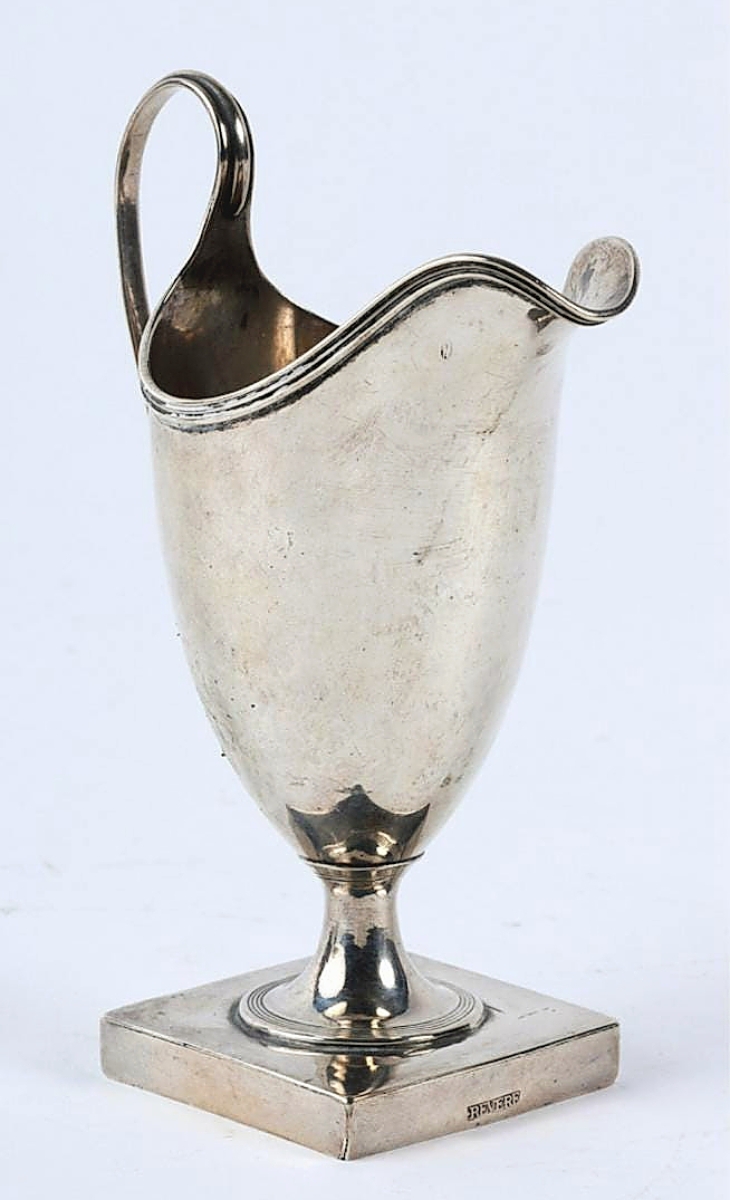
Topping the selection of early silver was a Paul Revere Jr helmet-form creamer. It was 6 inches tall and realized $22,800.
American furniture may have been a main interest, but the sale’s highest price, $48,000, was paid for an important “dressed” miniature portrait by the Way sisters, which is destined for a Connecticut museum exhibition. Around 1800, Connecticut sisters Mary Way and Betsy Way Champlain produced numerous miniature portraits. Some were a little different than the portrait miniatures usually seen. As described by author William L. Warren in a 1992 article, some utilized cutout paper profiles attached to fabric backgrounds, with facial features added in watercolor and with pieces of fabric pasted on the background to represent clothing. The work of the sisters has been the subject of several articles, including one by Brian Ehrlich, and their works have been included in numerous museum exhibitions. The example McInnis offered depicted a well-dressed, middle-aged woman walking with an open book in her hand. On a blue felt background and in a pressed brass frame, it was in very good condition and earned $48,000.
According to Tanya Pohrt, curator at the Lyman-Allyn Museum, New London, Conn., this miniature will be included in the museum’s upcoming exhibition, “The Way Sisters: Miniaturists of The Early Republic” scheduled to open in October. Ehrlich will be the guest curator. The exhibition will include between 40 and 50 examples of work by the Way sisters and their contemporaries from the museum’s collections, as well as examples from other public and private collections. There will be a catalog with new information on the sisters, as well as previously unpublished examples of their work.
Early American furniture was a major draw for this auction; some prices were strong, while others were held back, perhaps by condition issues. This collection was assembled at a time when collectors were less concerned about original condition than they are today. Minor defects did not deter buyers, and that sensibility can especially be seen in the ceramics portion of this sale, as well as in some of the furniture results. The highest price paid for a piece of furniture, $22,800, was earned by a small New York mahogany Chippendale blockfront, kneehole desk. It had a molded top, a shell carved lower center drawer above the kneehole and an arched panel door, on a shaped, molded base with ball and claw feet. It had an old but not original surface. The desk was discussed in the 2016 edition of Chipstone’s American Furniture. Surprisingly, $13,200, the second highest price in the furniture category, and far over the estimate, was earned by a miniature mahogany Hitchcock-type chest of drawers, only 15 inches tall. It had two drawers, stenciled decoration, gilt highlights, turned ball feet, original glass knobs, and the catalog stated that it may have been made by Buckley and Buckley in New York, circa 1830.
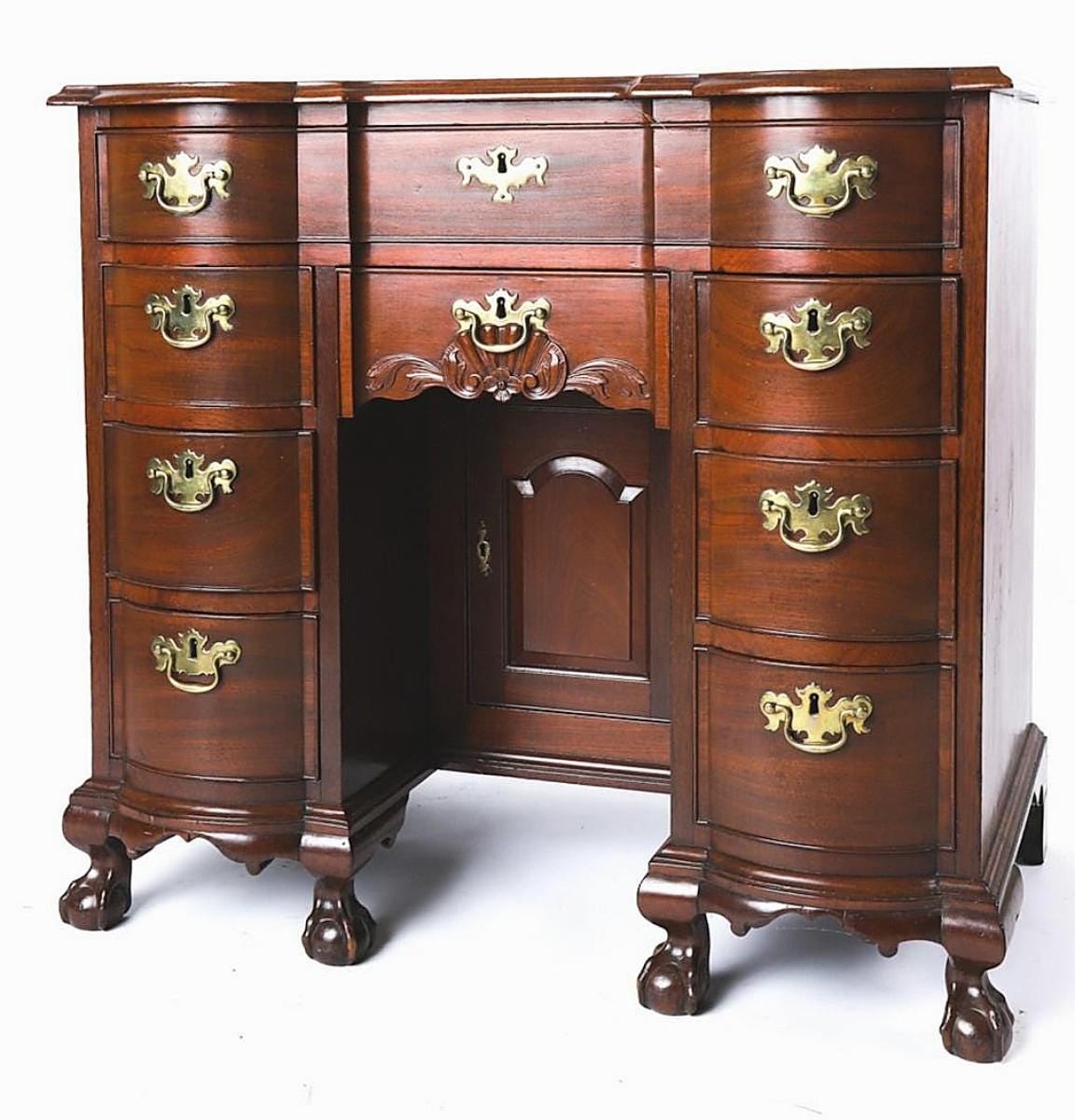
The highest priced piece of furniture in the sale, $22,800, was achieved by a small New York mahogany Chippendale blockfront kneehole desk. It had been discussed in the 2016 edition of Chipstone’s American Furniture.
Although passed during the sale, a cherry Connecticut River Valley tea table, circa 1760, was sold after the auction for $10,800. This table had descended in the Francis Garvan family and had been illustrated in Nutting’s Furniture Treasury. It had been refinished and had some minor condition issues, which may have deterred buyers during the sale, but it wound up being the third highest priced piece of furniture. An impressive Chinese Chippendale Newport serving table attributed to the Townsend family realized $8,400. It had pierced bracket returns and a mahogany top, but there was discussion during the preview that it may have once had a marble top. An 80-inch Federal period serpentine sofa with scrolled arms and old repairs finished way over the estimate at $4,500.
Two Willard clocks did well. An Aaron Willard shelf clock with a split-arch fret with finial and a chiming movement realized $6,000. The maker’s name was on one of the reverse painted panels. The other, a mahogany lyre-form wall clock attributed to Simon Willard, had a plume finial, a carved and pierced lyre and reverse painted panels. With restoration to the reverse painted panels and other condition issues, it ended at $3,600.
Presale interest does not always translate into high prices. Dan Meader said that there had been a lot of interest in a Wallace Nutting breakfront. It was illustration #799 in his Furniture Treasury. It had all the bells and whistles, including tape inlay, a shaped pediment with five brass finials, four paned doors with reverse painted floral bouquets, classical figures and more. It sold within the estimates for $3,000. There were numerous other pieces of reasonably priced good furniture and it was a good time to buy.
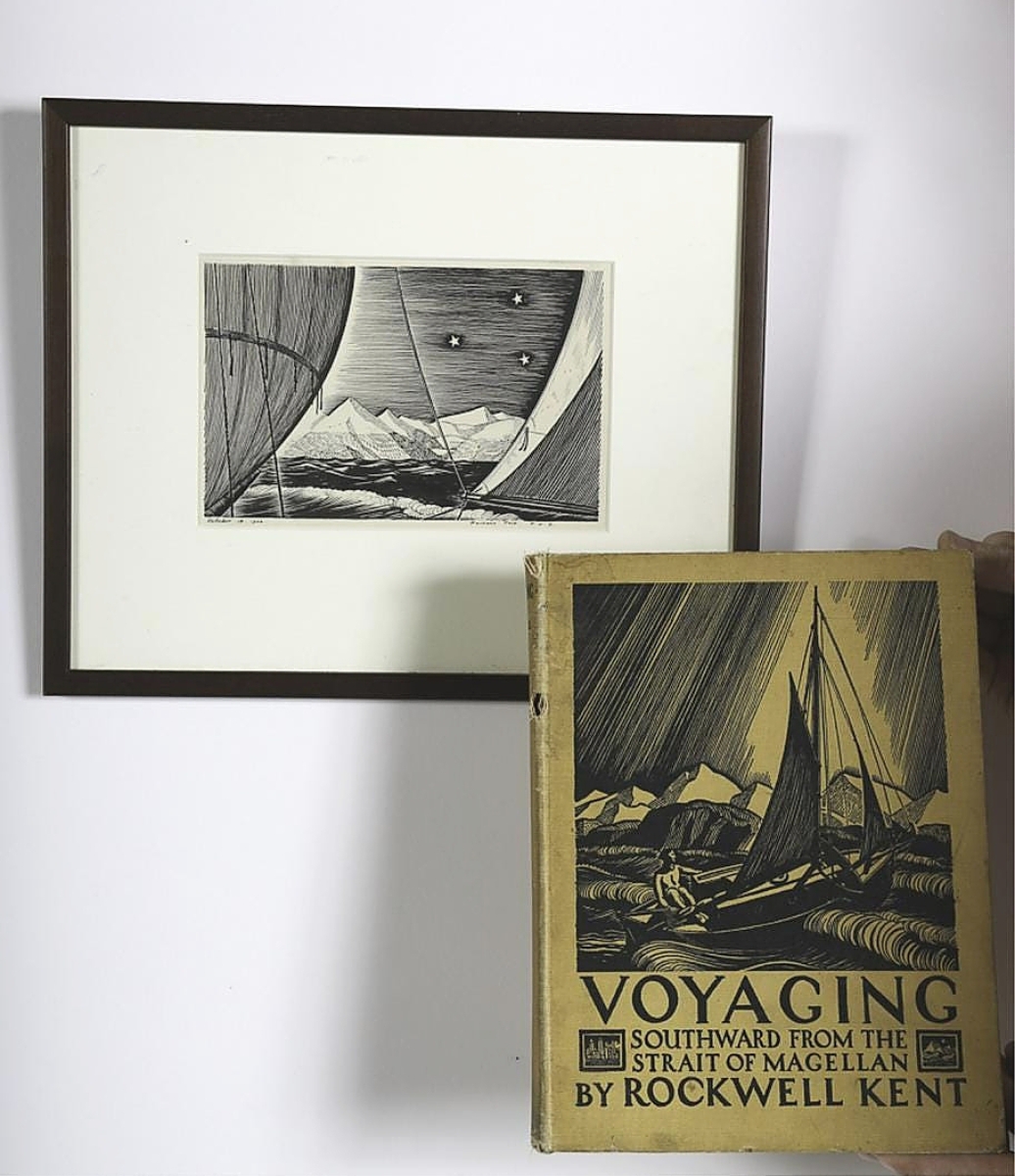
An ink on paper drawing signed and dated by Rockwell Kent earned $15,600. The drawing was an illustration for Voyaging Southward From The Strait of Magellan, appearing on page 49. A copy of the book accompanied the drawing.
Ceramics in the sale clearly demonstrated the changing attitudes to condition. There were more than a dozen Liverpool jugs, many of which had highly desirable historical scenes. The collection looked fine, displayed in a cabinet as it was during the preview. But almost all had hairlines, chips, restoration or other problems that cause today’s buyers to heavily discount their value. Even with the condition issues, some did well. A circa 1800 “Success to America” jug with a rare transfer earned $1,080. A “Sailor’s Farewell” jug, with a sienna transfer but with significant condition problems sold for $210. The same soft interest was apparent throughout the other ceramics. A lot of 11 pieces of Chinese export porcelain, including a lighthouse coffeepot with an American eagle, brought $360, a lot of 22 pieces of English pink luster, all with defects, sold for $210, and a lot of 16 pieces of copper luster, with defects, brought $150. Times do change.
A few days after the sale, John McInnis said, “It was like the old days, with lots of competition. This was a good sale and continues the trend we’ve seen over the last few months. We’re seeing a very energized group of buyers competing for quality material in all categories. Many are new to collecting. They’re asking questions and educating themselves about things that interest them. We’re doing business with people we’ve never dealt with before, and many are younger. That’s great for our business and the antiques business in general. The business has changed, and if we treat these new buyers right, business will be good for years to come.”
Prices given include the buyer’s premium as stated by the auction house. For information, www.mcinnisauctions.com or 978-388-0400.


























